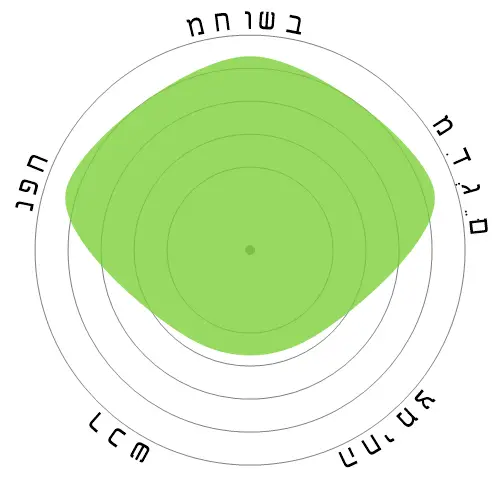מורים לחטיבה העליונה, למעט מיוחדים ולימודי מקצוע/טכניים




אנשים צפו גם
סיכון אוטומציה מחושב
סיכון מינימלי (0-20%): מקצועות בקטגוריה זו מציגים סיכוי נמוך לאוטומציה, מאחר והם דורשים בדרך כלל פתרון בעיות מורכב, יצירתיות, כישורי בינאישיים חזקים, ומיומנות ידנית גבוהה. משרות אלה לעיתים כוללות תנודות יד מורכבות ותיאום מדויק, מה שהופך את זה לקשה למכונות לשכפל את המשימות הנדרשות.
מידע נוסף על מהו הניקוד הזה, ואיך מחשבים אותו זמין כאן.
סקר משתמשים
המבקרים שלנו הצביעו שיש סיכוי נמוך שהמקצוע הזה ימורה לאוטומציה. הערכה זו מקבלת תמיכה נוספת מהמפתח של סיכון האוטומציה שנחשב, שמעריך 16% סיכוי לאוטומציה.
מה לדעתך הסיכון של אוטומציה?
מה הסיכוי שמורים לחטיבה העליונה, למעט מיוחדים ולימודי מקצוע/טכניים יוחלף על ידי רובוטים או אינטיליגנציה מלאכותית במהלך ה-20 השנים הבאות?
רגש
הגרף הבא כלול בכל מקום שבו יש כמות משמעותית של הצבעות כדי להציג נתונים משמעותיים. ייצוגים חזותיים אלה מציגים את תוצאות הסקרים של המשתמשים לאורך זמן, ומספקים אינדיקציה משמעותית למגמות הרגש.
רגשות לאורך זמן (שנתי)
צמיחה
מספר המשרות של 'Secondary School Teachers, Except Special and Career/Technical Education' מצופה להתמעט 0.6% עד 2033
תעסוקה כוללת, ומשרות פנויות משוערות
עדכונים לתחזיות משוערות צפויים להתבצע 09-2025.
שכר
ב-2023, השכר השנתי החציוני עבור 'Secondary School Teachers, Except Special and Career/Technical Education' היה 65,220 $, או 31 $ לשעה
'Secondary School Teachers, Except Special and Career/Technical Education' קיבלו שכר שהיה גבוה 35.7% מאשר השכר החציוני הלאומי, שעמד על 48,060 $
שכר לאורך זמן
נפח
נכון ל-2023 היו 1,045,170 אנשים שעסקו כ'Secondary School Teachers, Except Special and Career/Technical Education' בארצות הברית.
זה מייצג בערך 0.7% מהכוח העובד ברחבי המדינה
במילים אחרות, כאחד מ-145 אנשים מועסקים כ'Secondary School Teachers, Except Special and Career/Technical Education'.
תיאור המשרה
ללמד נושא אחד או יותר לתלמידים ברמת הבית הספר התיכון.
SOC Code: 25-2031.00


תגובות
Leave a comment
Due to remote learning and using similar designs that you mentioned, we have seen a 210% spike in high school drop outs, a 600% up shot of kids having at least 2-3 failing grades, and a gap between students who do not have access to tutors, internet or computers (or all three). A robot cannot tell an elementary student to reengage their students, let alone the sheer horror of classroom discipline being thrown out. Also, lets be real honest with secondary students, if they are given a generic problem trust me they will plagiarize and copy that down (just look at quizlet, or "write my paper" for proof). A human being needs to see if a student "gets" what is going on. A Teacher needs to have group interactions (and trust me you cannot do any sort of interactions with remote even with current programs- students just shut their cameras and mute themselves). Unless you are suggesting that a "few" will benefit from this dystopia, if so thank you Nancy Devos for your insight, but we educate everyone, and not the 1%.
Do you think the software being used led to those changes or the pandemic and economic downturn itself?
Easy to pass judgment when you have already drawn your conclusions. I've taught off and on since 2008 (mostly on, mostly secondary). Quizlet is the worst example you could provide of instructional technology we could employ to help all students.
When you discuss the one percent, you highlight a certain security the wealthy have that leads to less interruptions of education and that's a fair point. But I am not trying to describe a dystopia, but rather a better way to differentiate and tailor student learning to their particular needs, desires, strengths, and weaknesses.
Much of what effective teachers do is driven by inputs, points of data, about their students and their teaching. A properly designed system could analyze those inputs and apply strategies to intervene. It doesn't really matter the input, either.
Now that we are rolling out SEL technologies to help our kids, language translation applications that can help English learners, standards-based, interactively branching assessments and activities, the amount of information received is nothing trivial. The digital divide does truly make this a difficult prospect for some students, but that's not the question we are discussing here. Can teachers be replaced by "robots" in the future? Yes. Nothing would be more student-centred.
If the argument is about the socialization of students, that's not facilitated by teachers. It's actually stunted. Imagine learning plans that don't waste time with sages on stages. Imagine a truly adaptive system to check for understanding and intervene. Imagine that happening simultaneously for all students without the interruptions all teachers face daily just trying to teach. I realize virtual, and hybrid, learning did not go well for all students, but it was year one...something never attempted, and there was a society gone wild coupled with the inexperience of systems, personnel, and students.
I love teaching. I take it personally. But, if students were able to learn better from a robot than from me, I wouldn't take it personally. I'd celebrate it.
Learning with a teacher can mean a number of scenarios, including utilizing the learning software you mentioned.
The assurance of having someone who knows more than you, or at least knows where to find answers and explain them, will result in teachers have a very secure job.
I haven't even mentioned the emotional support and connection that makes a learning environment better, something I don't foresee AI replacing because seeing assuring words pop up on my screen is not the same as hearing it from a teacher, who is making eye contact with me and using body language.
השאירו תגובה לגבי מקצוע זה